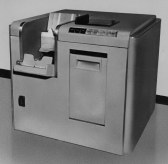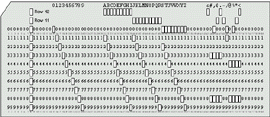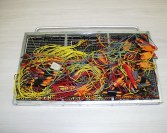Louis 'Skip' Sander
Computers
Lou knows a lot about computers. He is very experienced in the field, in both its technical and business aspects. He has spent well over 10,000 hours at various computer keyboards, both as a user and programmer.
Lou has sold millions of dollars worth of hardware, software, and services for companies like Microsoft, Xerox, Honeywell, and Digital Equipment Corporation. He has designed computer equipment that was featured in national magazines, and has written hundreds of small to medium-sized programs, mostly in dialects of BASIC. He has consulted on computer matters for organizations like America Online, NCR Corporation, Gas Desulfurization Corporation, and The Pennsylvania State University.
During the 1980s, he enjoyed a career as a writer for computer magazines, with hundreds of articles, columns, and reviews to his credit. He also wrote two computer books.
From the 1980s to the present, he has taught elementary computer subjects to hundreds of students in schools, colleges, and in his own seminars.
His first exposure to the field was in 1965, when he took a course in FORTRAN at the University of Chicago. This was in the days when programs were written on paper, then punched into cards which were processed by the computer.
Businessman
In 1968, Lou was data processing manager for a company that used IBM unit record equipment. This was primitive equipment that produced business reports from punched card input. It was programmed (if you want to call it that) by plugging wires into large panels that were later inserted into the equipment. As manager of the department, Lou was involved in supervision, troubleshooting, and systems analysis. He never got personally involved in the programming.
 |
 |
 |
IBM Card Reader
|
IBM Punched Card
|
Programming Board
|
From 1971 into the 1990's, Lou was a sales engineer for several computer companies, mostly involved in the healthcare field. He worked for pioneering hardware company Digital Equipment Corporation (DEC), selling clinical laboratory automation systems, radiation therapy planning systems, and EKG and nuclear medicine systems. In those days, these systems ran on minicomputers and sold for $50,000-$300,000. Today, most of them are incorporated directly into medical equipment.
For other companies, he marketed a wide range of computerized medical equipment, including CAT scanners, patient monitoring systems, cardiac catheterization equipment, ultrasound scanners and speech recognition systems. He also sold financial accounting systems to hospitals, physicians and small businesses, and sold software to universities for Microsoft.
In the 1980's, Lou was a board member of a large public library that bought and operated a pioneering minicomputer-based library circulation system. As the only board member with computer qualifications, he did extensive pre-purchase evaluations for the project. For the next ten years, he participated in every major decision regarding this system. During this time, the hardware was upgraded five times, the maintenance vendor was changed twice, and the defunct software vendor was replaced with with locally developed talent. Due in part to Lou's involvement, the system worked well from the beginning, and continued to do so for fifteen years.
Computer Owner
Lou bought his first computer, a Commodore PET, in early 1979. He soon taught himself to program it in BASIC and 6502 machine language. With the help of Victor Pitre, his technical mentor, he mastered the elements of digital electronics, mostly 8-bit TTL and CMOS. From that time on, he has continued hands-on learning about hardware, software and applications. He has owned many computers and has designed several hardware add-ons.
He has owned, used and programmed about twenty different microcomputer systems, including the Commodore PET, 8032, VIC-20, 64, Plus/4, 16 and 128; the Radio Shack TRS-80 I, TRS-80 III, and Model 100; a Timex-Sinclair; a Texas Instruments 99/4A, an Everex 286 desktop, a Toshiba 386 laptop, a NEC 486 machine, a Hewlett-Packard Pentium III machine, and currently a Dell Pentium IV system. He has owned and used two Macintoshes, but never wrote any programs for them.
He has worked with every MS-DOS version from 2.0 through 6.0, as well as CP/M and several Commodore operating systems, achieving intimate technical knowledge of several of the latter. In the Windows era, he has worked with Windows 3.1, Windows 95, Windows 98, Windows XP, and now Windows 7.
Over the years, Lou has mastered about 100 commercial software packages, often to the level of teaching them and reviewing them for magazines and online services. He is a power user of Microsoft Office Word, Excel, and Access, and has written numerous VBA add-ons for all three. He's also an advanced user of other programs such as Peachtree Premium Accounting, Photoshop Elements, Sony Vegas Studio, and CuteSITE Builder.
Lou has been communicating online since 1971. The modems of the day worked by holding a telephone's handset in two rubber cups. He was a consultant and featured personality on Quantum Link, the predecessor to America Online, and was active on that service even prior to its commercial startup in November, 1985. His suggestions have been incorporated into several commercial packages.
He has mastered nine different word processors, some through several versions: Microsoft Word, Word Perfect, Copy-Writer, Easy Script, RUNScript, Scripsit, Paper Clip, Plus/4 and MultiMate. With Word, he has mastered Macintosh version 4.0 and IBM DOS versions 3.0, 4.0, 5.0, 5.5 and 6.0; he has written macros for all these versions, and printer drivers for three of them. In the Windows era, he has worked extensively with all versions of Microsoft Word from the original Word for Windows through Microsoft Office Word 2003.
Programmer
Lou has written non-trivial programs in BASIC, 65xx Machine Language and Assembler, FORTRAN and MUMPS, plus the macro and scripting languages for many commercial software packages. He has worked with the operating system internals of several different systems.
Lou's BASIC programs, by far the most numerous, have been written in nineteen different dialects: currently Visual Basic 6.0, and previously Microsoft QuickBASIC 4.0 and 4.5, QBASIC, and GWBASIC; Commodore PET, 8032, VIC-20, 64, 128, Plus/4 and 16; Apple II; Atari 800; Tandy Model 100 and TRS-80; Timex-Sinclair; and Texas Instruments 99/4A and Professional BASICA.
His most general programming skill is creativity—the ability to know what the computer can or should do, to visualize an interesting application, and to craft an elegant implementation. Since he has an extensive knowledge of user needs, his programs tend to be widely used and appreciated. About 150 of them have been published in books, magazines and electronically. Most are highly crafted programs that do something useful or entertaining. The smallest is seven bytes, the largest 188K. During the 1980's and early 1990's, several of his published programs, notably disk utilities and music programs, were in daily use around the world.
Writer
In In 1981, Lou began writing technical articles for computer magazines. The articles included tutorials, reviews, and projects for beginners through advanced technical users. His specialty was Commodore computers, which were the best selling computers of the day. Within a few years, his work had been published over fifty times in ten different magazines, and had been reprinted in several books.
The magazines included Compute, Commander, Commodore Magazine, Power/Play, Computer Bookbase, Interface Age, MICRO, Microcomputing, RUN and Transactor (Canada). Some of the books were COMPUTE's First Book of Commodore 64, COMPUTE's First Book of Apple, and Machine Language for Beginners.
Some typical articles were:
"The Selectric Word Processor" (computer hardware and software, plus conversion information for electromechanical typewriters, to create a complete word processing system)
"All About the Status Register" (an explanation of 6502 microprocessor internals)
"All About the WAIT Instruction" (the first complete description, including undocumented features, of the least-understood statement in Microsoft's Commodore BASIC)
"A New Technique for Mixing BASIC and Machine Language" (an ingenious productivity tool for advanced programmers)
"Statistician" (an elementary statistical analysis program in BASIC, with versions for Commodore, Apple and Atari computers)
From 1984-1991, Lou became a widely-read columnist in major computer magazines. His Magic column, featuring user-submitted tips and tricks, was the flagship feature of RUN Magazine, which in 1985 was the country's second fastest-growing magazine of any kind. During this period he wrote two books published by McGraw-Hill, and contributed to two others from Addison-Wesley. One of his books was independently translated into Italian.
During the 1980s, Commodore machines were the world's largest-selling computers, selling more units than Apple or IBM and its clones. With the success of his articles and columns, Lou was the country's most prolific and widely-read writer on Commodore subjects. He also published on Apple and IBM. Not counting pass-along readership, his writing had 30 million exposures in more than a hundred countries. On any day from 1985-1990, he could visit any shopping mall in North America and find his work in the bookstore.
As the Commodore boom wound down, so did Lou's writing activities, and today he doesn't actively write for publication.
Teacher
In 1981, Lou designed and presented the first session of Computer Kindergarten, an introductory computer course for adults. This course evolved over the next five years as he presented it to dozens of groups in the Pittsburgh area. Computer Kindergarten is a half-day session that gives students an elementary understanding of computer hardware, software and applications. It features unusual learning aids from many non-technical fields. During the next four years, he presented Computer Kindergarten to students at Learning Unlimited, Duquesne University, Carlow College, University of Pittsburgh Medical Center, The American Association of University Women, WQEDFM, and many similar organizations.
In 1985, Lou taught his first course for Community College of Allegheny County. This was a non-credit computer literacy course for adults, conceived, created and taught by Lou. It became one of the College's most popular courses, and Lou taught it many times over the next two years.
From 1986-1987, he taught college credit courses, now with the luxury of fully-equipped computer labs. He developed and taught Introduction to Computing, BASIC Programming I and BASIC Programming II, for a total of twelve sections over six semesters. While doing this part-time teaching, he was his campus' principal advisor on purchases of textbooks and software.
In the 1990s, Lou began teaching computer courses for ICM School of Business, a two-year postsecondary school in Pittsburgh. He continued this work into the late 2000s, mostly teaching Introduction to Computers and various courses in Microsoft Word, Excel, and Access.